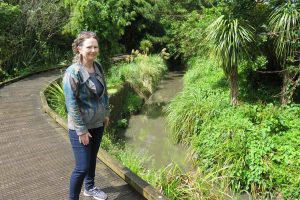[Update: Mayor Phil Goff’s 10-year budget provides for a targeted rate to improve water quality – costing about $1.70 a week for an average household. Most of that will go toward speeding up the $1b-plus Central Interceptor pipeline through Mt Albert to the Mangere wastewater treatment plant, reducing overflows into the Waitemata Harbour within 10 years – 20 years earlier than planned.]
Mt Albert people need to step up and play their role in helping to save Auckland’s creeks, beaches and harbours from pollution after decades of neglect.
That’s the strong message from one of our environmental leaders, Elizabeth Walker, chair of the St Lukes Environmental Protection Society (STEPS), and at the centre of the group’s concerns is Meola Creek, which runs through Mt Albert.
After heavy rain, the normally quiet-flowing creek turns into a raging torrent – eventually dumping its toxic blend of suburban waste into the Waitemata Harbour.
While Auckland Council has the prime responsibility of cleaning up the city’s waterways for future generations, STEPS wants everyone to share its vision of an Auckland where:
- Our beaches are suitable for swimming
- People live in balance with our creeks, rivers, harbours and water use
- Native fish and birds can be seen at all our creeks
- Kai moana can safely be gathered and consumed
But, says Elizabeth Walker, this will only be possible with the help of every person and an acceptance that we all have to pay if we want clean harbours and beaches.

The problem is that stormwater after heavy rain flows into sewage pipes, and the polluted mixture – with sediments and heavy metals from roads and roofs – quickly ends up in creeks feeding the harbour.
Elizabeth (pictured here on the Roy Clements Treeway at the edge of Meola Creek) says Auckland Council has under-invested in handling stormwater, “and we believe it can no longer be treated as a buried problem”.
“But it is us, not just the council, who drive the cars and build concrete surfaces,” she says. “We all need to help by planting alongside streams or monitoring pests, or just by living in a way that respects the fantastically beautiful volcanic landscape on which Auckland sits.
“Let’s help the council do the right thing for the harbours by dealing with our stormwater, so that future generations are not caught in the same situation. “
Elizabeth has written a backgrounder for Mt Albert Inc detailing the enormous environmental cost of an expanding city that until now has chosen to side-step the pollution dangers of stormwater.
And one of the biggest contributors to the pollution of the Waitemata Harbour is Meola Creek, which runs through the heart of Mt Albert alongside the treeway.
When it rains, the creek rises rapidly with metal-laden stormwater and sewage, dumping about a million cubic metres of polluted waste a year into the Waitemata.
STEPS wants Auckland Council – and Aucklanders generally – to push water treatment up alongside transport as the most critical issue to tackle to protect the city and its waterways for future generations.
“We want the council to start on stormwater treatment and wetland pilots immediately – and the STEPS wetland in the treeway is an example of how much nature can do to treat water and recharge the aquifer if the council can just slow the flow,” says Elizabeth.
“The best stormwater treatment is “green” – wetlands and rain gardens. We can all contribute but the council and Auckland Transport need to deal with the massive amounts of road runoff. “
After decades of relative inaction, the council is showing signs of getting serious. In October, the environment and community committee voted to consider the proposed stormwater infrastructure proposal for the western isthmus as part of the long-term plan consultation in February next year.
The long-awaited proposal for stormwater and wastewater work around the planned Central Interceptor includes stormwater separation, a wastewater tunnel from Grey Lynn (Cox’s creek) and stormwater treatment.
But in the end, it all comes down to money and priorities – and STEPS hopes Mt Albert people will offer their voices in support of clean creeks, harbours and beaches for future generations.
Bruce Morris
The big issues: the future of our waterways and Mt Albert’s part in it







